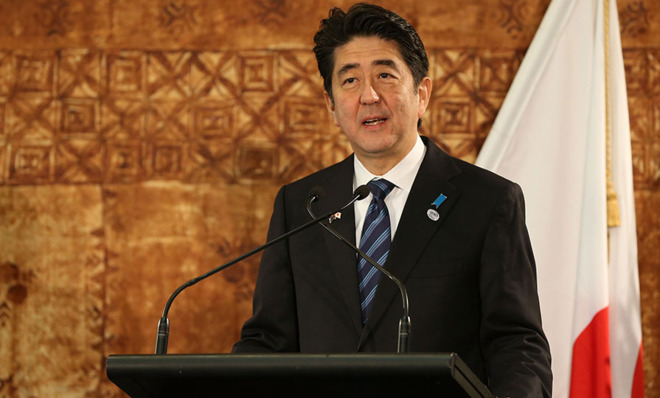The lessons of Japan's latest recession
This should be a "warning siren" for the rest of the world

A free daily email with the biggest news stories of the day – and the best features from TheWeek.com
You are now subscribed
Your newsletter sign-up was successful
Japan is back in one of its all-too-familiar slumps, said John Cassidy at The New Yorker. The world's third-largest economy slipped into a recession last week, its fourth since the financial crisis, prompting Prime Minister Shinzo Abe to dissolve the Diet and call a snap election. It's "a risky but justified gambit," since an electoral victory later this month will give him a mandate to continue his so-called Abenomics stimulus policies. A three-pronged approach launched in 2012 to lift the Japanese economy out of two decades of stagnation, Abenomics has undeniably worked. Billions in government spending, a massive uptick in the money supply, and structural reforms like getting more women into the workforce were beginning to have an effect: The Nikkei was rising, output was accelerating, and confidence was improving. "But then Abe, yielding to deficit hawks who were concerned about Japan's large debt burden," introduced a big increase in the sales tax this spring. That sent consumer spending into a tailspin and brought on the latest recession.
Abe's "opposition is in such disarray that there is little doubt" he'll be returned to office, said Michael Schuman at Time. But a renewed vote of confidence won't fix Abenomics's fundamental flaws. The results of his policies have been far less impressive than Abe's fans will admit, and the price too dear. In truth, Japan's economy is stagnant "because there is a lack of demand," and printing ever-more amounts of cash won't change that fact. If Japan ever hopes to recover, the country will need far deeper reforms, including more productivity and fewer trade barriers. Moving ahead that boldly "requires more political will than Abe has shown."
Japan's latest setback should be a "warning siren" for the rest of the world, especially Europe, said Mohamed El-Erian at Bloomberg View. European Central Bank President Mario Draghi has advocated adopting similar policies to Abenomics to get the euro zone out of its doldrums. But Japan's stumble shows the "difficulty of correcting impediments to growth that have become deeply embedded in the economy." While Abe has succeeded at juicing the money supply and ramping up government spending, he has struggled "to break down entrenched economic interests," even though he has the backing of much of the public. Now just imagine how hard it will be for economies that lack Japan's "social cohesion and sense of collective action" to enact similar reforms.
The Week
Escape your echo chamber. Get the facts behind the news, plus analysis from multiple perspectives.

Sign up for The Week's Free Newsletters
From our morning news briefing to a weekly Good News Newsletter, get the best of The Week delivered directly to your inbox.
From our morning news briefing to a weekly Good News Newsletter, get the best of The Week delivered directly to your inbox.
The lesson for U.S. policymakers is similarly clear: "Don't pull out support for the economy too soon, or the recovery will collapse," said Danny Vinik at The New Republic. Raising the sales tax in Japan was a "critical policy mistake," even though it was aimed at tackling the country's enormous debt. Hopefully, lawmakers and regulators in Washington get the message that they shouldn't "implement dumb policies" that prematurely cut off growth, like making significant cuts to government spending or raising interest rates prematurely. Congress should "heed the warnings from Japan's economy and adopt a 'do no harm' economic agenda." Only then can the U.S. economy "fully recover."
A free daily email with the biggest news stories of the day – and the best features from TheWeek.com
Sergio Hernandez is business editor of The Week's print edition. He has previously worked for The Daily, ProPublica, the Village Voice, and Gawker.
-
 James Van Der Beek obituary: fresh-faced Dawson’s Creek star
James Van Der Beek obituary: fresh-faced Dawson’s Creek starIn The Spotlight Van Der Beek fronted one of the most successful teen dramas of the 90s – but his Dawson fame proved a double-edged sword
-
 Is Andrew’s arrest the end for the monarchy?
Is Andrew’s arrest the end for the monarchy?Today's Big Question The King has distanced the Royal Family from his disgraced brother but a ‘fit of revolutionary disgust’ could still wipe them out
-
 Quiz of The Week: 14 – 20 February
Quiz of The Week: 14 – 20 FebruaryQuiz Have you been paying attention to The Week’s news?